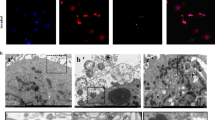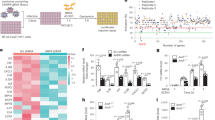Abstract
Macrophages play a crucial role in host innate anti-Staphylococcus aureus defense, which is tightly regulated by multiple factors, including microRNAs. A recent study showed that miR-24 plays an important role in macrophage polarization. Here, we investigated the biological function of miR-24 in S. aureus-stimulated macrophages. The results revealed that miR-24 expression was significantly decreased in both human and mouse macrophage cell lines with S. aureus stimulation in a time-dependent manner. Moreover, miR-24 overexpression significantly decreased the production of M1 phenotype markers, such as IL-6, iNOS, TNF-α, CD86, and CD80, whereas it increased the production of M2 markers, such as Arg1, CCL17, CCL22, CD163, and CD206, in S. aureus-stimulated macrophages. Conversely, knockdown of miR-24 promoted M1 macrophage polarization but diminished M2 macrophage polarization in S. aureus-stimulated macrophages. Furthermore, CHI3L1 was predicted as a target gene of miR-24 using bioinformatics software and identified by luciferase reporter assay. Additionally, miR-24 overexpression inhibited CHI3L1 expression and downregulated the downstream MAPK pathway in S. aureus-stimulated macrophages. Finally, CHI3L1 overexpression rescued macrophage polarization and MAPK pathway inhibition induced by miR-24 mimic transfection in S. aureus-stimulated macrophages. In conclusion, the data suggest that miR-24 serves as a molecular regulator in S. aureus-induced macrophage polarization through targeting of CHI3L1 and regulation of the MAPK pathway, which may provide a promising therapeutic target for S. aureus-related infections and inflammatory diseases.






Similar content being viewed by others
Abbreviations
- miRNA:
-
MicroRNAs
- MAPK:
-
Mitogen-activated protein kinase
- CHI3L-1:
-
Chitinase-3-like-1 protein
- ERK:
-
Extracellular regulated protein kinase
- JNK:
-
c-Jun N-terminal kinase
References
van Hal, S.J., S.O. Jensen, V.L. Vaska, B.A. Espedido, D.L. Paterson, and I.B. Gosbell. 2012. Predictors of mortality in Staphylococcus aureus bacteremia. Clinical Microbiology Reviews 25: 362–386.
Boucher, H., L.G. Miller, and R.R. Razonable. 2010. Serious infections caused by methicillin-resistant Staphylococcus aureus. Clinical Infectious Diseases 51(Suppl 2): S183–S197.
Mediavilla, J.R., L. Chen, B. Mathema, and B.N. Kreiswirth. 2012. Global epidemiology of community-associated methicillin resistant Staphylococcus aureus (CA-MRSA). Current Opinion in Microbiology 15: 588–595.
Alper S, Warg LA, De Arras L, Flatley BR, Davidson EJ, Adams J, Smith K, Wohlford-Lenane CL, McCray PB, Jr., Pedersen BS, et al. 2016. Novel innate immune genes regulating the macrophage response to Gram positive bacteria. Genetics 204: 327–336.
Flannagan, R.S., B. Heit, and D.E. Heinrichs. 2015. Antimicrobial mechanisms of macrophages and the immune evasion strategies of Staphylococcus aureus. Pathogens 4: 826–868.
O’Connell, R.M., D.S. Rao, and D. Baltimore. 2012. microRNA regulation of inflammatory responses. Annual Review of Immunology 30: 295–312.
O’Connell, R.M., K.D. Taganov, M.P. Boldin, G. Cheng, and D. Baltimore. 2007. MicroRNA-155 is induced during the macrophage inflammatory response. Proceedings of the National Academy of Sciences of the United States of America 104: 1604–1609.
Jurkin, J., Y.M. Schichl, R. Koeffel, T. Bauer, S. Richter, S. Konradi, B. Gesslbauer, and H. Strobl. 2010. miR-146a is differentially expressed by myeloid dendritic cell subsets and desensitizes cells to TLR2-dependent activation. Journal of Immunology 184: 4955–4965.
Tili, E., J.J. Michaille, A. Cimino, S. Costinean, C.D. Dumitru, B. Adair, M. Fabbri, H. Alder, C.G. Liu, G.A. Calin, and C.M. Croce. 2007. Modulation of miR-155 and miR-125b levels following lipopolysaccharide/TNF-alpha stimulation and their possible roles in regulating the response to endotoxin shock. Journal of Immunology 179: 5082–5089.
Quinn, S.R., and L.A. O’Neill. 2011. A trio of microRNAs that control Toll-like receptor signalling. International Immunology 23: 421–425.
Li, M., J. Wang, Y. Fang, S. Gong, M. Wu, X. Lai, G. Zeng, Y. Wang, K. Yang, and X. Huang. 2016. microRNA-146a promotes mycobacterial survival in macrophages through suppressing nitric oxide production. Science Reports 6: 23351.
Fordham JB, Naqvi AR, Nares S. 2015. miR-24 regulates macrophage polarization and plasticity. Journal of Clinical & Cellular Immunology 6(5): 362.
Isidro, R.A., and C.B. Appleyard. 2016. Colonic macrophage polarization in homeostasis, inflammation, and cancer. American Journal of Physiology. Gastrointestinal and Liver Physiology 311: G59–G73.
Serbina, N.V., T. Jia, T.M. Hohl, and E.G. Pamer. 2008. Monocyte-mediated defense against microbial pathogens. Annual Review of Immunology 26: 421–452.
Leitinger, N., and I.G. Schulman. 2013. Phenotypic polarization of macrophages in atherosclerosis. Arteriosclerosis, Thrombosis, and Vascular Biology 33: 1120–1126.
Xu, F., Y. Kang, H. Zhang, Z. Piao, H. Yin, R. Diao, J. Xia, and L. Shi. 2013. Akt1-mediated regulation of macrophage polarization in a murine model of Staphylococcus aureus pulmonary infection. Journal of Infectious Diseases 208: 528–538.
Wei, Y., and A. Schober. 2016. MicroRNA regulation of macrophages in human pathologies. Cellular and Molecular Life Sciences 73: 3473–3495.
Xu, W., M. Liu, X. Peng, P. Zhou, J. Zhou, K. Xu, H. Xu, and S. Jiang. 2013. miR-24-3p and miR-27a-3p promote cell proliferation in glioma cells via cooperative regulation of MXI1. International Journal of Oncology 42: 757–766.
Ye, S.B., Z.L. Li, D.H. Luo, B.J. Huang, Y.S. Chen, X.S. Zhang, J. Cui, Y.X. Zeng, and J. Li. 2014. Tumor-derived exosomes promote tumor progression and T-cell dysfunction through the regulation of enriched exosomal microRNAs in human nasopharyngeal carcinoma. Oncotarget 5: 5439–5452.
Jin, W., E.M. Ibeagha-Awemu, G. Liang, F. Beaudoin, X. Zhao, and L. le Guan. 2014. Transcriptome microRNA profiling of bovine mammary epithelial cells challenged with Escherichia coli or Staphylococcus aureus bacteria reveals pathogen directed microRNA expression profiles. BMC Genomics 15: 181.
Lawrence, T., and G. Natoli. 2011. Transcriptional regulation of macrophage polarization: enabling diversity with identity. Nature Reviews Immunology 11: 750–761.
Xiao, S., X. Wang, H. Ni, N. Li, A. Zhang, H. Liu, F. Pu, L. Xu, J. Gao, Q. Zhao, et al. 2015. MicroRNA miR-24-3p promotes porcine reproductive and respiratory syndrome virus replication through suppression of heme oxygenase-1 expression. Journal of Virology 89: 4494–4503.
Johansen, J.S., P.E. Hoyer, L.A. Larsen, P.A. Price, and K. Mollgard. 2007. YKL-40 protein expression in the early developing human musculoskeletal system. Journal of Histochemistry and Cytochemistry 55: 1213–1228.
Johansen, J.S. 2006. Studies on serum YKL-40 as a biomarker in diseases with inflammation, tissue remodelling, fibroses and cancer. Danish Medical Bulletin 53: 172–209.
Di Rosa, M., G. Malaguarnera, C. De Gregorio, F. Drago, and L. Malaguarnera. 2013. Evaluation of CHI3L-1 and CHIT-1 expression in differentiated and polarized macrophages. Inflammation 36: 482–492.
Areshkov, P.O., S.S. Avdieiev, O.V. Balynska, D. Leroith, and V.M. Kavsan. 2012. Two closely related human members of chitinase-like family, CHI3L1 and CHI3L2, activate ERK1/2 in 293 and U373 cells but have the different influence on cell proliferation. International Journal of Biological Sciences 8: 39–48.
Kawada, M., H. Seno, K. Kanda, Y. Nakanishi, R. Akitake, H. Komekado, K. Kawada, Y. Sakai, E. Mizoguchi, and T. Chiba. 2012. Chitinase 3-like 1 promotes macrophage recruitment and angiogenesis in colorectal cancer. Oncogene 31: 3111–3123.
Author information
Authors and Affiliations
Corresponding author
Ethics declarations
Conflict of Interest
The authors declare that they have no conflict of interest.
Rights and permissions
About this article
Cite this article
Jingjing, Z., Nan, Z., Wei, W. et al. MicroRNA-24 Modulates Staphylococcus aureus-Induced Macrophage Polarization by Suppressing CHI3L1. Inflammation 40, 995–1005 (2017). https://doi.org/10.1007/s10753-017-0543-3
Published:
Issue Date:
DOI: https://doi.org/10.1007/s10753-017-0543-3




